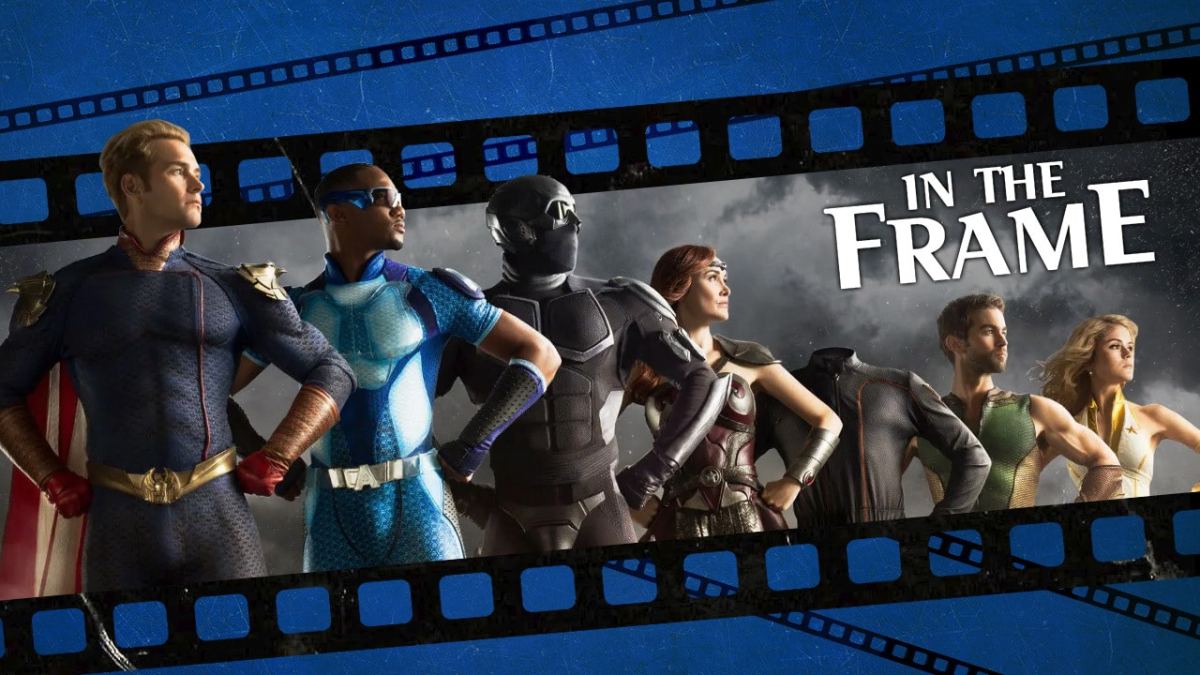Sometimes subtlety is overrated.
The Boys is a superhero parody. Its targets are quite easily identifiable, with little effort to disguise. Even the superheroes themselves have obvious analogues among classic superheroes. Homelander (Antony Starr) is obviously an homage to Superman. Black Noir (Nathan Mitchell) is obviously riffing on Batman. A-Train (Jessie T. Usher) is transparently a stand-in for the Flash. The Deep (Chace Crawford) is largely a vehicle for familiar jokes about the uselessness of Aquaman.
Adapted from a comic book by writer Garth Ennis and artist Darick Robertson, The Boys is extremely crass and juvenile, embracing a decidedly teenage sensibility. Early in the first season, the eponymous group of anti-superhero terrorists finds themselves tasked with assassinating an invisible superhero with impervious skin, named Translucent (Alex Hassell). The group decides that the best way to kill that character is plant a bomb in his rectum and detonate it. It works. Messily.
There are times when The Boys is almost too obvious for its own good. The second season features the introduction of a millennial superhero to the Seven. Her codename is Stormfront (Aya Cash). She is from Portland, Oregon. She is savvy on social media, branding herself as an anti-establishment figure who speaks her mind. The first three episodes of the season build to a big reveal about the new addition, with the climax of the third episode exposing Stormfront as an unrepentant racist.
This is treated as a seismic twist. Amazon released the first three episodes of the second season of The Boys on the same day, obviously anticipating that the reveal would be a gut punch to catch the audience off guard and garner attention. It is a big moment within the world of the show, with Stormfront murdering a family of African Americans as she rampages through an apartment building and using a racial slur before murdering an opponent from East Asia. It certainly got people talking.

Even leaving aside the possibility that the audience might be familiar with the source material, this reveal is heavily foreshadowed. The sole defining character traits afforded to this new hero point to an archetypal depiction of the alt-right. Her name is Stormfront, which she shares with one of the most active online communities for white nationalists. Ignoring the even more obviously racist character from which she is drawn, it would be surprising if Stormfront weren’t a massive racist.
The Boys is populated with lots of smaller examples of this lack of subtlety. One sequence features Homelander, a violent and delusional narcissist who is hailed as a hero, completely missing the point of Taxi Driver, a movie about a violent and delusional narcissist who is hailed as a hero. There is no mistaking what The Boys is saying or thinking at any given moment. The series signposts its intent with all the grace of bullhorn at full volume.
Of course, if anything, The Boys is a much subtler work than its source material. Garth Ennis is a comic book writer with a broad and bawdy sensibility. The comic book version of The Boys is largely a vehicle for Ennis to work out his self-described “suspicion and disdain” for superheroes, often in extremely graphic and sexually explicit manners. For fans of Ennis, this no-holds-barred approach is part of the charm. For those less charitable, it’s just crass.
Little of what Ennis writes would work on television, even within the relative freedom of a streaming service. Showrunner Eric Kripke recalls that when he was developing the show, friends would say, “I dare you to do the plane scene.” The first season features a version of the sequence, in which a botched rescue by Homelander dooms a plane full of innocent people, a blackly comic disaster set piece. However, the show changes one key detail: the comic’s version took place on Sept. 11, 2001.

Indeed, the series makes some welcome changes to Ennis and Robertson’s source material, turning The Boys into a more complicated parable than the comic from which it draws. Ennis’ critique of superheroes falls flat when he has his anti-superhero characters give themselves superpowers to fight their opponents. The television series has (to date) avoided powering up Bill the Butcher (Karl Urban) or Hughie Campbell (Jack Quaid), adding philosophical weight to the central conflict.
Still, The Boys brings enough of Ennis and Robertson’s punk aesthetic to the screen. There are more elegant and nuanced takes on the superhero genre, even some exploring the same themes. HBO’s Watchmen offers a much more sophisticated and contextual exploration of modern American racism, and it has been credited with changing the way that Oklahoma teaches history. Christopher Nolan’s Dark Knight trilogy took “a thermometer to the fevered brow of post-9/11 America.”
However, it’s hard to resist the bright colors and the bold choices that make The Boys such a distinct show. The Boys is a television series that communicates through a foghorn, grappling with heavy themes and big ideas in ways that do not so much confront the audience as slap them across the face. This is part of what superheroes do, offering a heightened framework through which the contemporary world might be filtered. Superheroes can punch Hitler and process Watergate.
Superheroes can be aspirational figures, empowerment fantasies that offer imaginary spaces to those in need of escape. However, superheroes can also serve as a mirror to the culture around them, personifying the mood and atmosphere of the time. After all, comics are a serialized medium, and it is possible to trace many characters back through the bulk of the American Century. What would superheroes reflect right now?

It’s a question that many have been asking in light of the current moment, and it’s a question that has many complicated answers. The Boys offers one possible answer: a ubiquitous corporate product manufactured by faceless corporations for mindless public consumption, essentially celebrity unencumbered by humanity, but which is inexorably tied to broader cultural and social forces despite efforts to present them as apolitical. It is a very cynical take, but these are very cynical times.
There is a debate in contemporary television criticism. Some critics mourn the passing of the so-called “Golden Age of Television,” the wave of prestige dramas like The Sopranos, The Wire, and Mad Men that arrived at the turn of the millennium. These shows reflected contemporary American anxieties in artful ways. Those shows have ended, and most critics agree that the era is over. Even shows that resemble these earlier series, like Better Call Saul, feel like a eulogy for the movement.
Critics have had trouble classifying the wave of television that followed. A lot of contemporary “zeitgeisty” television tends to be denser, more expensive, and more provocative. There are various reasons for this, most obviously the need to grab and hold attention in the crowded landscape of “peak TV.” While some critics lament the shift away from more traditional fare, insisting that “TV isn’t art any longer,” this lack of subtlety perhaps is more in step with the present moment.

Journalists have been declaring irony dead for decades. Despite what some might claim, the insanity of the modern world hasn’t yet killed satire. It has, however, made satire much more difficult. The world increasingly seems like a (dark and twisted) cartoon reality. The president of the United States is a reality television star and has turned politics into reality television. The writers of Veep had to actually cut jokes because of how surreal the world had become. Reality is itself heightened.
Writer Kurt Anderson has argued that contemporary America has ventured “through the looking glass and down the rabbit hole.” When the world feels as uncanny as any superhero comic, it is reassuring to have a television show that is attempting to compete. If superheroes aspire to be larger than life, then The Boys understands the scale of that undertaking. The Boys is vulgar, violent, crass, and often tasteless. It is gratuitous, absurd, and incredibly mean-spirited.
In that way, it seems like a perfect funhouse reflection of the times in which it finds itself.






Published: Sep 18, 2020 11:00 am